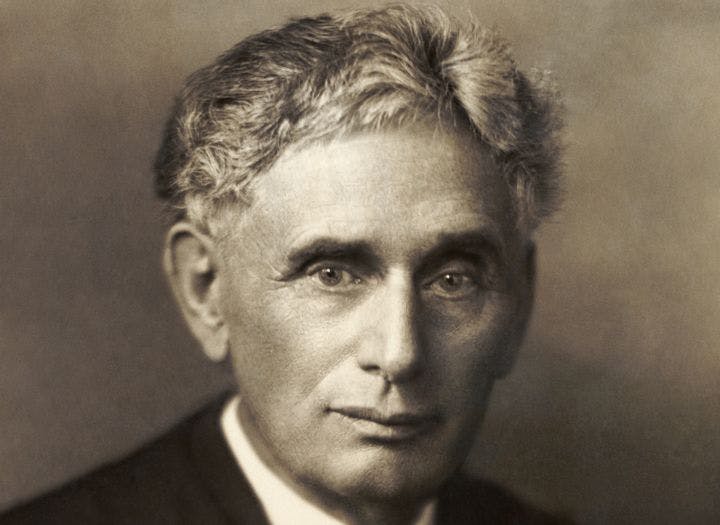Fall 2009
Remember the Titan
– Benjamin Wittes
The life of Louis D. Brandeis, a figure in American legal history whose influence is so profound and pervasive that he cannot be politically classified.
At more than 900 pages, Melvin Urofsky’s biography of one of the U.S. Supreme Court’s titanic figures is a doorstop. Merely to describe its contents will no doubt have many prospective readers running for the exits. Brandeis (1856–1941) was a man of uncommon diversity, so to read about the fullness of his life requires not merely an interest in Supreme Court history but in Progressive Era politics, antitrust policy, Zionism, railroads, turn-of-the-century labor-management disputes, savings bank life insurance (a particular passion), the Woodrow Wilson administration, and countless reform projects in which Brandeis played a major role. Such is the scope and detail of Urofsky’s project—and of Brandeis’s activities that remain of interest today—that not until page 460 does the book’s hero sit on the high court, in 1916, at the age of 59.
Yet Urofsky’s book is something of a page turner. To be sure, an editor keen to ensure that those who began the book finished it could have trimmed a goodly number of pages without sacrificing much. But Urofsky, a historian at Virginia Commonwealth University, does a remarkable job of sucking the reader into the various worlds in which Brandeis lived and worked.
Brandeis—who grew up in Louisville and made his career in Boston—is one of those figures in American legal history whose influence is so profound and pervasive that he is difficult to classify. To this day, he personifies, along with Thurgood Marshall, the liberal ideal of a justice who champions social justice. He did battle with conservative forces, both on and off the Court. And along with Oliver Wendell Holmes Jr., he stood against the constitutionalization of pro-business policies by his judicial colleagues. Franklin Delano Roosevelt called him “Isaiah”—a reference both to his Judaism and to his having, in the view of many New Dealers, prophetically warned of the social ills that would trigger the Great Depression. And, of course, he famously created the notion of a right to privacy, an idea he articulated in a landmark 1890 law review article. He is thus justly a liberal icon.
Yet Antonin Scalia probably owes Brandeis as much as Ruth Bader Ginsburg does. Brandeis’s attack on the aggressive judicial conservatism of his day helped shape modern judicial conservatism’s creed of restraint. He opposed investing the constitutional protection of due process with substantive rights; at the time, that meant opposition to the right of business to operate free of regulation, though now it would mean, among other things, opposition to constitutionally protected abortion. Brandeis was a committed believer in the right of states to experiment with policies; he mistrusted bigness in government almost as much as he loathed it in business. And he vigorously insisted on the jurisdictional limits of the federal courts—a position commonly opposed by today’s judicial liberals and embraced by conservatives.
Urofsky’s exhaustive exploration of Brandeis’s pre-Court years goes a considerable distance toward squaring this apparent circle. Brandeis’s hands were seemingly in everything, from the resolution of Boston’s transportation issues to the running of the American Zionist movement, from the advising of President Wilson to the mediation of major labor disputes. He helped build up Harvard Law School. He wrote muckraking pamphlets and lasting works of legal scholarship. He helped invent the notion of pro bono legal work.
Oddly, however, Urofsky’s treatment of Brandeis’s jurisprudence itself is not especially rich. The book is weighted in favor of lengthy discussions of intra-Zionist politics and railroad regulation in New England at the expense of the great jurisprudential arguments during Brandeis’s service on the Supreme Court. Urofsky does an excellent job explicating Brandeis’s role in the shift away from the legal classicism of the turn of the century, but the sheer volume of other material downplays his role on the Court.
The book has other quirks. For example, Urofsky seems to make a point of de-emphasizing anti-Semitism as a factor in Brandeis’s life—even where its role is glaringly obvious, such as in the ugly battle that preceded his confirmation to the Court. In the main, however, the book takes on a sweeping set of subjects in the person of Louis Brandeis and offers, through him, an often-moving tour of a period of great change and tumult in the law.
* * *
Benjamin Wittes is a senior fellow in governance studies at the Brookings Institution and the author of Confirmation Wars: Preserving Independent Courts in Angry Times (2006), among other books.
Reviewed: "Louis D. Brandeis: A Life" by Melvin I. Urofsky, Pantheon, 2009.
Photo courtesy of Wikimedia Commons
